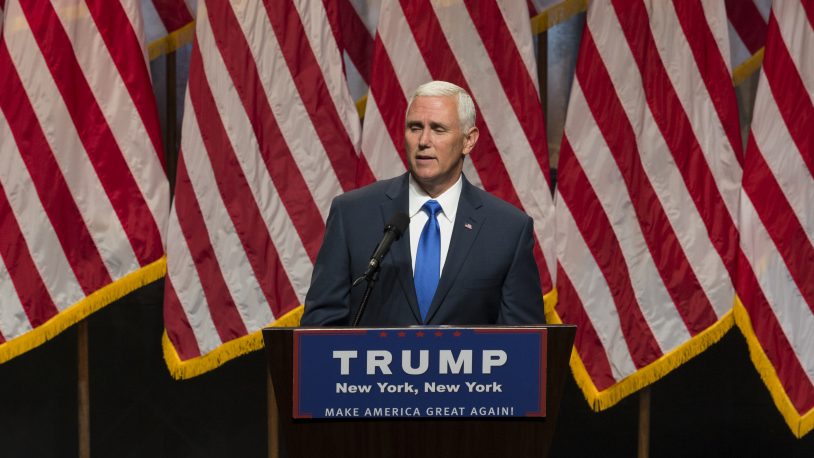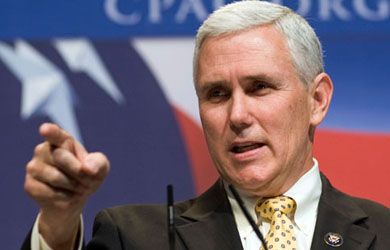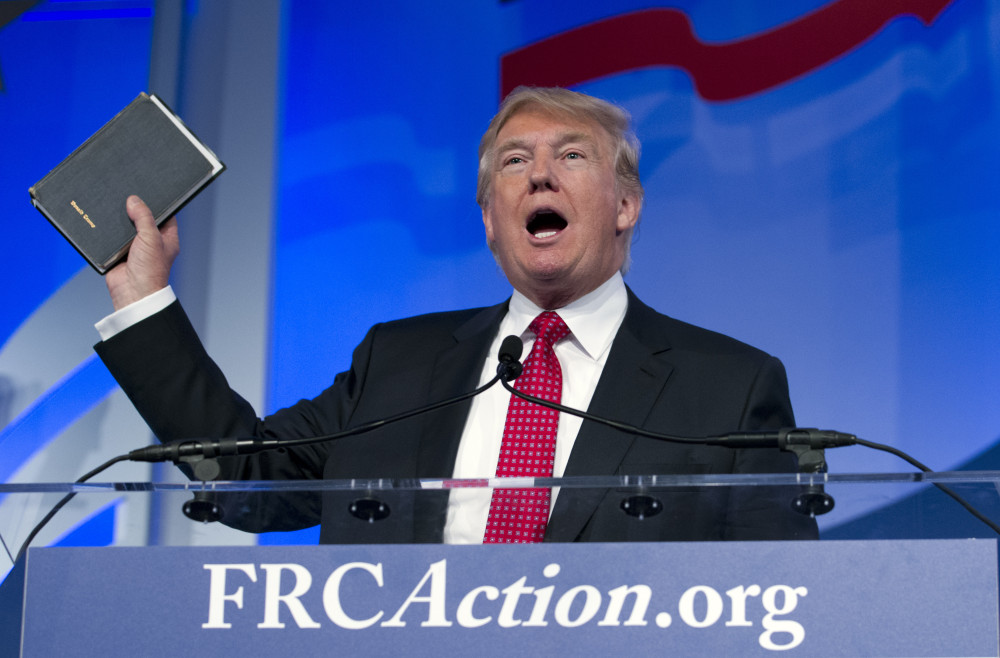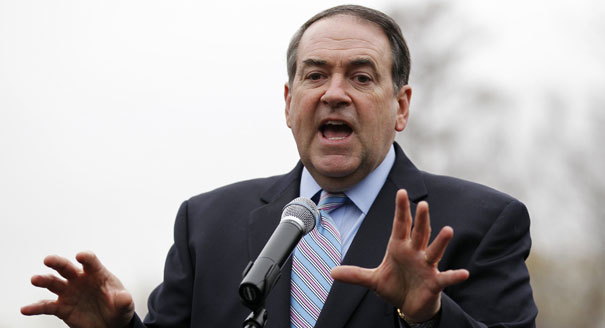Following the release of a 2005 tape in which Donald Trump bragged about how he could sexually assault women thanks to his celebrity status, several Republican politicians have announced that instead of voting for Trump they will write in his running mate, Indiana Gov. Mike Pence, on Election Day. Others have even gone so far as to call on Pence to replace Trump at the top of the ticket.
While Trump has pledged to stay in the race, the attempt to paint Pence as an acceptable alternative to Trump belies the fact that Pence is anything but mainstream.
Here are 12 reasons why Pence, a self-described Rush Limbaugh acolyte, is hardly a better option than Trump:
1) Abortion Rights
A fervent opponent of abortion rights, Pence frequently declares that he wants to “send Roe v. Wade to the ash heap of history where it belongs,” comparing the ruling to the Dred Scott decision. Earlier this year he told the far-right Values Voter Summit that a Trump administration would begin its fight against abortion rights on “the first day we take office.”
His record as a congressman and governor shows that he is deeply committed to the anti-choice cause.
He backed two “personhood” bills to grant legal status to zygotes, an effort that, if successful, would outlaw abortion and could curtail certain types of birth control, and in 2000 called for Congress to “enact a human life amendment to the constitution” and pass “legislation that makes clear that the 14th Amendment’s protections apply to unborn children.”
Furthermore, as Huffington Post has reported, “Pence cosponsored the Ultrasound Informed Consent Act, a bill that would have required abortion providers to perform an ultrasound on a woman seeking abortion, regardless of whether it was medically necessary, and then describe the embryo in detail to her. He also cosponsored a bill that would have essentially redefined rape, prohibiting federal funds from paying for abortion except in cases of ‘forcible rape,’ and a bill that would allow hospitals to deny abortions to pregnant women who would die without the care.”
As governor, he signed a law “banning abortions motivated by the race, gender, ancestry, or disability status of the fetus” that “also required that all fetal remains be buried or cremated” and “mandated that abortion providers have admitting privileges at local hospital,” a targeted regulation used by anti-choice groups to shut down abortion providers. A federal judge blocked the law as unconstitutional and many Hoosier women joined a “Periods for Pence” campaign to call the governor’s office to “report our periods” since “any period could potentially be a miscarriage without knowledge,” putting women “at risk of penalty if they do not ‘properly dispose’ of this or report it.”
Indiana’s abortion laws are so restrictive that one woman was incarcerated for what prosecutors said was a self-induced abortion.
2) Planned Parenthood
In Congress, Pence was behind the 2011 push for a shutdown of the federal government unless Planned Parenthood was prohibited from receiving federal aid, even though such funding didn’t go towards the group’s abortion services, promising that he would “be after” Planned Parenthood until they stopped “providing abortions.” As governor, Pence steered money from the Temporary Assistance for Needy Families (TANF) program to anti-abortion “crisis pregnancy centers.”
“The days of public funding for Planned Parenthood are over when a Trump-Pence administration arrives in Washington, D.C.,” he said in a speech to the Values Voter Summit last month.
3) Ex-Gay Therapy
During his 2000 run for Congress, Pence came up with a proposal to divert funds from organizations working to prevent the spread of HIV/AIDS to groups involved in discredited ex-gay therapy.
On his campaign website, Pence said that gays and lesbians should not receive equal recognition or legal protections from discrimination, before urging the government to direct taxpayer dollars “toward those institutions which provide assistance to those seeking to change their sexual behavior” instead of those “that celebrate and encourage the types of behaviors that facilitate the spreading of the HIV virus.”
- Congress should oppose any effort to put gay and lesbian relationships on an equal legal status with heterosexual marriage.
- Congress should oppose any effort to recognize homosexual’s as a “discreet and insular minority” entitled to the protection of anti-discrimination laws similar to those extended to women and ethnic minorities.
- Congress should support the reauthorization of the Ryan White Care Act only after completion of an audit to ensure that federal dollars were no longer being given to organizations that celebrate and encourage the types of behaviors that facilitate the spreading of the HIV virus. Resources should be directed toward those institutions which provide assistance to those seeking to change their sexual behavior.
The fact-checking group PolitiFact “found no evidence Pence has walked back his stance on public funding for conversion therapy.” Indeed, the Republican National Committee adopted a plank opposing laws that try to limit unsafe and discredited sexual orientation conversion therapies as part of its party platform this year.
4) HIV/AIDS
While Pence never achieved his plan of transferring money meant for HIV groups to ex-gay therapists, as governor he did slash funding for public health programs, continued attacks against Planned Parenthood, which provides testing services, and was a staunch opponent of needle exchange programs.
In recent years, an HIV epidemic emerged in Scott County, Indiana, mostly stemming from intravenous drug use. A Planned Parenthood clinic in the county, the county’s only HIV testing center, closed in 2013 when the state drastically cut funding to the group, even though that particular clinic didn’t offer abortion services. Pence was a leading voice in the movement to defund Planned Parenthood.
In 2015, there were clear signs of an emerging HIV epidemic in Pence’s state, but the governor “dragged his feet,” taking months to approve a needle exchange program, citing moral qualms about such an undertaking. “It was disappointing that it took so much effort to bring the governor on board,” a Republican state lawmaker said at the time, while another commented: “He doesn’t recognize this as a crisis?”
Back in 1996, Pence criticized the Republican National Convention in San Diego for including “AIDS activists” as speakers, suggesting that their inclusion was a slap in the face to “pro-family conservatives.” The “AIDS activists” in question were Mary Fisher, an HIV-positive woman who was a former staffer for President Ford and had led the National Commission on AIDS, and Hydeia Broadbent, an HIV-positive minor.
5) LGBT Rights
One month after Arizona’s governor vetoed a measure that would have permitted businesses to deny services to LGBT customers, Pence signed a similar bill in Indiana, calling it “a measure that frankly, Indiana should have enacted many years ago.” He only signed a revised version of the law after a national outcry against it.
Pence has also been involved in an anti-LGBT organization in his state: “In the early 1990s, Pence was a board member for the Indiana Family Institute, a conservative advocacy group that has long opposed gay rights. At the time, the organization was led by Bill Smith, who would later become Pence’s chief of staff in Congress and during his first two years as governor. Smith is now a Pence campaign consultant.”
In the 1990s, as an editor of a conservative journal, he published works on “gaydom” and phony ties between homosexuality and pedophilia.
In Congress, Pence opposed a 2007 “bill to protect gays and lesbians from workplace discrimination,” the Employment Non-Discrimination Act, and the 2009 Shepard-Byrd legislation “to expand the definition of a hate crime to include the victim’s sexual orientation.”
He has also called for both a federal constitutional amendment to ban same-sex marriage and a similar state constitutional amendment. In 2006, he urged Congress to “say ‘no’ to activist courts bent on redefining” marriage, arguing that the Constitution should prevent same-sex couples from marrying because “societal collapse was always brought about following an advent of the deterioration of marriage and family.”
6) Don’t Ask Don’t Tell
In 2000, Pence said he wanted to scrap Don’t Ask Don’t Tell and replace it with a sweeping ban on gay service members, saying that he supported “bringing an end to the ‘don’t ask/don’t tell’ policy of permitting homosexuals to serve in the armed forces.” “Homosexuality is incompatible with military service because the presence of homosexuals in the ranks weakens unit cohesion,” he said.
Pence took to the House floor in 2010 to denounce the repeal of Don’t Ask Don’t Tell as an attempt to use the military “as a vehicle to advance a liberal political agenda” and “break faith with our men and women in uniform,” warning that it would harm military cohesion, morale and recruitment. He also told CNN that the open service of gay members amounts to “social experimentation.”
7) Refugees
Trump has made opposition to the resettlement of Syrian refugees a key fixture of his campaign, suggesting that they are terrorists and vowing to deport legally settled refugees.
As governor, Pence tried to prevent Syrian refugees from settling in Indiana, “forcing the local Indianapolis resettlement agency to scramble to look for another placement” for one family from Syria. “How could that be the freedoms that we hear about?” the family’s father commented. Pence suggested that such refugees might be terrorists and tried to prevent refugee agencies working in the state from receiving federal aid.
A federal district court judge prohibited Pence’s action and called it “national origin discrimination,” and an appeals court agreed, finding that it was “the equivalent of his saying (not that he does say) that he wants to forbid black people to settle in Indiana not because they’re black but because he’s afraid of them.”
8) Race
On the campaign trail, Pence criticized those who want to address issues about racial disparities and bias within law enforcement, accusing them of using “the rhetoric of division.”
“Donald Trump and I believe that there’s been far too much talk of institutional bias or racism within law enforcement,” he said, adding that “we ought to set aside this talk, this talk about institutional racism and institutional bias.”
9) Science
In a 2002 speech on the House floor, then-congressman Pence mocked evolution and said that schools should “consider teaching other theories of the origin of species,” praising Creationism as a legitimate scientific theory because it is based in the Bible and “was believed in by every signer of the Declaration of Independence.”
He is also a climate science denialist, stating that “global warming is a myth” and opposing regulations on greenhouse gas emissions.
10) Media
Pence must have appreciated Trump’s call to “open up the libel laws” against journalists, as the Indiana governor has already taken the conservative movement’s contempt against the media to a whole new level by attempting to create a state-run news agency.
He sought to create a taxpayer-funded state news outlet called “Just IN” that would have its own editorial and news teams, in hopes of creating a news service “overseen by political staff” that “could write stories that would be picked up by smaller newspapers that don’t have big newsrooms.”
Pence eventually abandoned the plan after it was widely mocked as an attempt to create a Pravda-style propaganda outlet.
11) Smoking
The “pro-life” leader has been an ardent defender of the tobacco industry:
Over his political career Gov. Mike Pence (R-IN) has consistently carried the tobacco industry’s water, denying the dangers of cigarettes, opposing government regulation, and slashing smoking cessation efforts. In return, they rewarded him with more than $100,000 in campaign donations.
In 2000, Gov. Mike Pence (R-IN), then running for an open U.S. House seat, came out against a proposed settlement between government and the tobacco industry, calling it “big government.” In a shocking editorial, he wrote: “Time for a quick reality check. Despite the hysteria from the political class and the media, smoking doesn’t kill.” Pence acknowledged that smoking is not “good for you,” but claimed that two-thirds of smokers do not die from smoking related illness and “9 out of ten smokers do not contract lung cancer.” He warned of a slippery-slope in which government would soon seek to discourage fatty foods, caffeine, and SUVs.
…
In 2009, Pence was one of just 97 people in the U.S. House of Representatives to vote against the bipartisan Family Smoking Prevention and Tobacco Control Act, which gave the Food and Drug Administration the power to regulate cigarettes and blasted a 2009 bill to expand healthcare for kids as “a tax increase on smokers to pay for a new middle-class entitlement.”
He mocked talk “about the scourge of tobacco and the resultant premature deaths” as “the worst kind of Washington-speak” and warned that a “government big enough to go after smokers is big enough to go after you.”
12) Mulan
Back in 1999, Pence criticized the Disney movie “Mulan” as the creation of a “mischievous liberal” who was trying to influence “the cultural debate over the role of women in the military.”
And yet, he said that “Mulan” actually justifies bans on women in combat since “young Ms. Mulan falls in love with her superior officer!”
“You see, now stay with me on this, many young men find many young women to be attractive sexually,” he wrote. “Many young women find many young men to be attractive sexually. Put them together, in close quarters, for long periods of time, and things will get interesting. Just like they eventually did for young Mulan. Moral of story: women in military, bad idea.”









